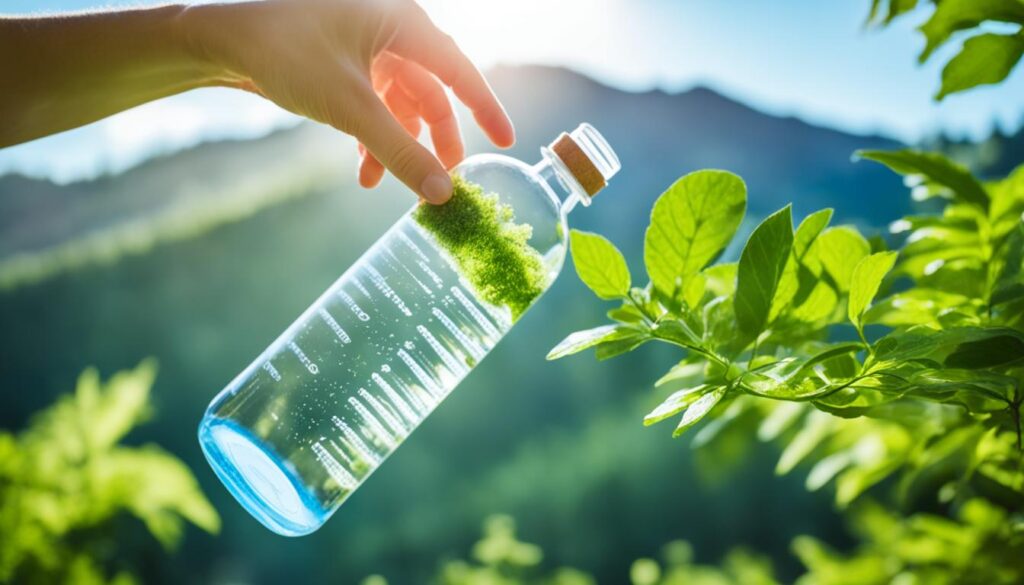Starting a water-only fast can change your life. This water-only fasting guide aims to teach beginners about the complexity of this diet. In water-only fasting, you drink only water and eat no solid food. It’s both the simplest and toughest diet. People like it for its benefits of water fasting, such as losing weight and flushing out toxins. This method also promises to refresh both your physical and mental health.
Before you start water fasting for weight loss or other health gains, be careful. While it has its perks, there are risks of water fasting like minor aches or severe electrolyte issues. This guide is for those in the United States wanting a full understanding of fasting with only water.
Key Takeaways
- Understanding the principles behind water-only fasting enhances its efficacy.
- Recognition of physical benefits, including weight loss and detoxification, is crucial.
- Being cognizant of potential risks informs a safer fasting experience.
- Consulting healthcare professionals before commencing water-only fasting is recommended.
- Gradual introduction to fasting can prepare the body and mind for this rigorous practice.
Understanding Water-Only Fasting
Water fasting is an ancient health practice. It means you drink only water and eat no food. Many are drawn to its simplicity and the deep wellness journey it offers. People looking into starting water fasting often want to know what results to expect.
Definition and Brief History
Water fasting is a practice that goes back to ancient times. Early cultures held it in high regard for spiritual and health reasons. In modern times, it’s a way to reset the body for better health and mental clarity. It has a rich history, but today, it’s easier to find guidance and support for water fasting.
The Science Behind Fasting and Autophagy
The key to water fasting is autophagy, a crucial cleanup process in our cells. It helps cells get rid of waste and supports cell renewal. This is what makes water fasting so beneficial. Studies show it can help defend against various health issues and might even extend life.
Differentiating Water-Only Fasting from Other Types
Water fasting is different from other fasting methods because there’s no food allowed. This helps the body fully engage in cleansing itself without digesting food. Understanding this difference is important for those thinking about starting this type of fast. It ensures you realize the unique benefits of water fasting.
| Fasting Type | Description | Duration | Common Results |
|---|---|---|---|
| Intermittent Fasting | Eating within a specified time window each day. | 16-20 hours daily | Improved metabolic flexibility, weight management. |
| Partial Fasting | Limited intake of specific foods or caloric beverages. | 1-3 days | Detoxification, increased energy levels. |
| Water-Only Fasting | No caloric intake; water only. | 24 hours to several days | Enhanced autophagy, potential weight loss, mental clarity. |
To start this journey, plan a feasible fasting schedule. Go into it knowing how it can change you both physically and mentally.
Water-only Fasting Guide
Starting a water fasting journey is a way to follow a long-standing tradition for health and renewal. It’s important to have the best water fasting tips and know how to start water fasting safely. Always check with a healthcare professional before you start, especially if you have health issues or take medication.

Drinking 2-3 liters of water every day is essential to avoid dehydration and keep your minerals balanced. If you want to fast longer than 24 hours, talk with your doctor. They can explain the risks and benefits to help you stay safe.
To maximize the health benefits and minimize risks, steer clear of heavy exercises during the fast and plan for a mindful, gradual reintroduction of food to avoid refeeding syndrome.
- Consult a healthcare professional before starting
- Maintain 2-3 liters of water intake daily
- Discuss extended fasts with a healthcare provider
- Avoid intensive exercises during fasting
- Gradually reintroduce food post-fast
A well-done fast can offer many benefits, like balancing hormones and reducing stress and inflammation. Health should always come first. The right preparation and knowledge are key in this journey towards self-discovery and better health.
Preparing for Your First Water Fast
Water fasting offers benefits like weight loss and body detox. But, understanding and following water fasting safety precautions is vital. To stay healthy and get the best results, preparation is crucial. Here, we outline steps for a successful and safe water fast.

Physical Preparation Strategies
Beginners should start with short-term intermittent fasting. This helps your metabolism get used to burning fat for energy. Eating whole foods and cutting back on sugars and refined carbs makes fasting easier.
Transitioning to Whole Foods and Hydration
To prepare for a water fast, shifting your diet is key. Aim for a diet rich in whole foods to boost your vitamins and minerals. Staying hydrated is vital. Including sea salt, magnesium, and potassium helps keep your body’s minerals balanced during the fast.
Mindset and Mental Readiness
Getting your mind ready is just as essential as preparing your body. A positive mindset helps manage hunger. Also, connecting with experienced fasters brings support and advice.
Keep physically active but stick to light activities. Herbal teas are great for staying hydrated during your fast. They help maintain your well-being without overdoing it.
Executing a Safe and Effective Water Fast
Water fasting can be a life-changing journey, offering weight loss and other health perks. Learning the water fasting schedule is key to doing it right. Short-term fasts usually last 1 to 2 days and most people can do these safely on their own. However, if you plan a longer fast, you should have a health expert guide you. They help prevent any risks and keep your fasting safe.
Listening to your body during the fast is crucial. Whether you’re fasting to lose weight or for health, pay attention to your body and mind. You might feel less energetic or experience mild headaches. These are signs your body is cleaning itself. If you feel really bad, though, you should stop the fast. The aim of fasting is to improve health, not worsen it.
Staying hydrated is the main part of water fasting. Drinking plenty of water helps your body get rid of toxins and stay healthy while you’re not eating. When the fast ends, be careful about how you start eating again. Go slow when introducing solid foods to prevent any digestion problems. The way you end your fast is just as important as the fasting itself for maintaining health and success.




